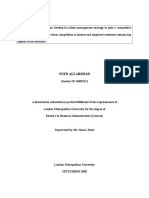The Significance of Organisational Behaviour
Uploaded by
Gde SaraswastaThe Significance of Organisational Behaviour
Uploaded by
Gde SaraswastaThe significance of organisational behaviour
A major report from the Chartered Management Institute (CMI) on the state of UK management
and leadership points out that the UK lags behind its competitors in terms of productivity
and management practice and reminds us that: ‘At its heart, the art of management is the
art of managing people.’
But, worryingly, this is where British managers fall down most. We need a change in attitude
in the UK, whereby management is seen as a highly professional role where integrity is seen
as a virtue, and where ethics are valued as highly as profitability.1
Increasing recognition is given to the demand not only for technical skills alone, but also for
good people skills as a basis of organisational effectiveness. The importance of skills including
understanding human behaviour and interpersonal skills is a wide and frequent source of
attention, including government agencies such as The UK Commission for Employment and
Skills (UKCES), The Department of Business Innovation & Skills, and other bodies such as
the Prince’s Trust, the Advisory, Conciliation and Arbitration Service (ACAS) and professional
institutes. Against this backdrop the study of organisational behaviour can be seen of even
greater significance.
Organisational Behaviour is one of the most complex and perhaps least understood academic
elements of modern general management, but since it concerns the behaviour of people
within organisations it is also one of the most central . . . its concern with individual
and group patterns of behaviour makes it an essential element in dealing with the complex
behavioural issues thrown up in the modern business world.2
Vecchio suggests three reasons for studying organisational behaviour
You might also like
- (Alnoor Bhimani) Contemporary Issues in Management (BookFi)100% (1)(Alnoor Bhimani) Contemporary Issues in Management (BookFi)464 pages
- The Functionally Fluent Organisation - An Update: Terry Wright - February 2016No ratings yetThe Functionally Fluent Organisation - An Update: Terry Wright - February 20164 pages
- Management Consulting and International Business S PDFNo ratings yetManagement Consulting and International Business S PDF15 pages
- Management Consulting and International Business S PDFNo ratings yetManagement Consulting and International Business S PDF15 pages
- Euro Fin Management - 2021 - Urquhart - PHD CEOs and Firm PerformanceNo ratings yetEuro Fin Management - 2021 - Urquhart - PHD CEOs and Firm Performance49 pages
- Notes for MPOB for (Foundation of Management ) (2)No ratings yetNotes for MPOB for (Foundation of Management ) (2)101 pages
- The Impact of People Management Practices On Business Performance: A Literature ReviewNo ratings yetThe Impact of People Management Practices On Business Performance: A Literature Review90 pages
- A Response To Sir David Walker's Report August 2009No ratings yetA Response To Sir David Walker's Report August 200922 pages
- Achieving Better Practice Corporate Governance in The Public Sector1No ratings yetAchieving Better Practice Corporate Governance in The Public Sector150 pages
- MBA - LHC101 - 11462 - Jan 2024 - S1 - AssignmentNo ratings yetMBA - LHC101 - 11462 - Jan 2024 - S1 - Assignment4 pages
- techUKMapping-the-Responsible-AI-Profession-final-paperNo ratings yettechUKMapping-the-Responsible-AI-Profession-final-paper38 pages
- Board Structure and Corporate Performance in MalaysiaNo ratings yetBoard Structure and Corporate Performance in Malaysia15 pages
- Human Capital Theory Assessing The EvidenceNo ratings yetHuman Capital Theory Assessing The Evidence96 pages
- Study Notes On Corporate Administratio1No ratings yetStudy Notes On Corporate Administratio1162 pages
- Human Resource Management in The UK Public Service: Its Practice and Its Relevance To Public Reformers in South AfricaNo ratings yetHuman Resource Management in The UK Public Service: Its Practice and Its Relevance To Public Reformers in South Africa33 pages
- Talent Management and Development An Overview of Current Theory and PracticeNo ratings yetTalent Management and Development An Overview of Current Theory and Practice20 pages
- Transforming HR Second Edition Creating value through people The HR Series Mark Withers download100% (2)Transforming HR Second Edition Creating value through people The HR Series Mark Withers download83 pages
- Institutional Effectiveness: Global Governance in Human ResourceNo ratings yetInstitutional Effectiveness: Global Governance in Human Resource47 pages
- The Differences Between Human Resource ManagementNo ratings yetThe Differences Between Human Resource Management18 pages
- Changing Role of Management Accountant - CIMA v2No ratings yetChanging Role of Management Accountant - CIMA v213 pages
- Financial Director FD Qualifications May09No ratings yetFinancial Director FD Qualifications May092 pages
- Mckinsey Quarterly - Talent Shortage On European BanksNo ratings yetMckinsey Quarterly - Talent Shortage On European Banks5 pages
- Excellence and The Leadership Imperative: Rick - Edgeman@mail - Biz.colostate - EduNo ratings yetExcellence and The Leadership Imperative: Rick - Edgeman@mail - Biz.colostate - Edu22 pages
- Mfg en Paper Subsidies and Financial Performances of the Microfinance Institutions Does Management Matter Jan 2006 0No ratings yetMfg en Paper Subsidies and Financial Performances of the Microfinance Institutions Does Management Matter Jan 2006 030 pages
- Knowledge and Human Capital As Sustainable Competitive Advantage in Human Resource Management2019Sustainability SwitzerlandNo ratings yetKnowledge and Human Capital As Sustainable Competitive Advantage in Human Resource Management2019Sustainability Switzerland18 pages
- Independent Directors and Stakeholders Protection: A Case of Sime DarbyNo ratings yetIndependent Directors and Stakeholders Protection: A Case of Sime Darby13 pages
- The Human Side of Outsourcing: Psychological Theory and Management PracticeFrom EverandThe Human Side of Outsourcing: Psychological Theory and Management PracticeStephanie J. MorganNo ratings yet
































































